Ethics and Health Law
VerifiedAdded on 2022/12/19
|13
|3493
|1
AI Summary
This document discusses the concept of ethics and health law, specifically focusing on mandatory reporting, benefits and risks, ethical concerns, laws, and challenges. It provides an overview of the National Law and its impact on healthcare professionals. The document also explores the issues and challenges associated with mandatory reporting, including confidentiality concerns and the focus on past conduct. Overall, it offers valuable insights into the intersection of ethics and health law.
Contribute Materials
Your contribution can guide someone’s learning journey. Share your
documents today.
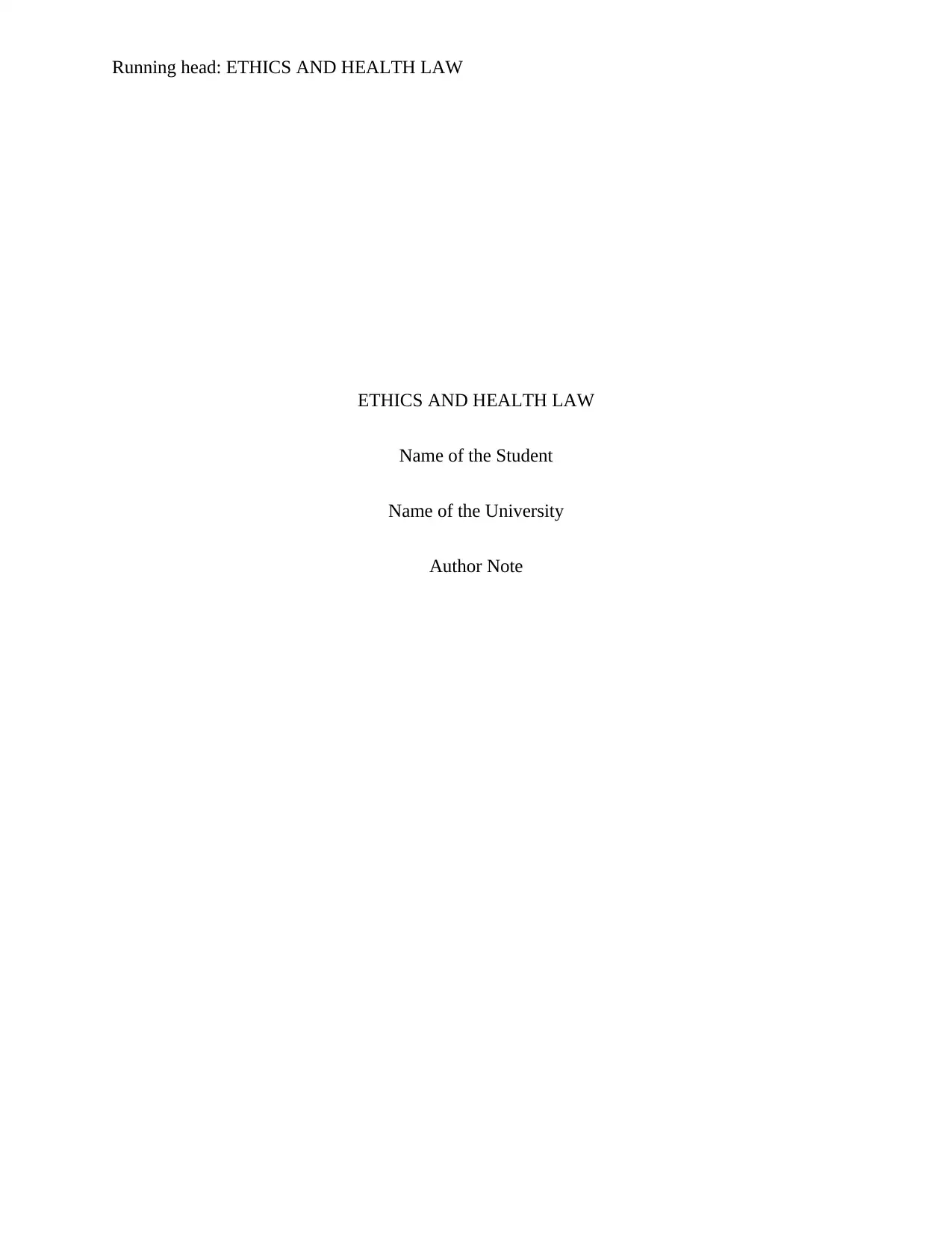
Running head: ETHICS AND HEALTH LAW
ETHICS AND HEALTH LAW
Name of the Student
Name of the University
Author Note
ETHICS AND HEALTH LAW
Name of the Student
Name of the University
Author Note
Secure Best Marks with AI Grader
Need help grading? Try our AI Grader for instant feedback on your assignments.
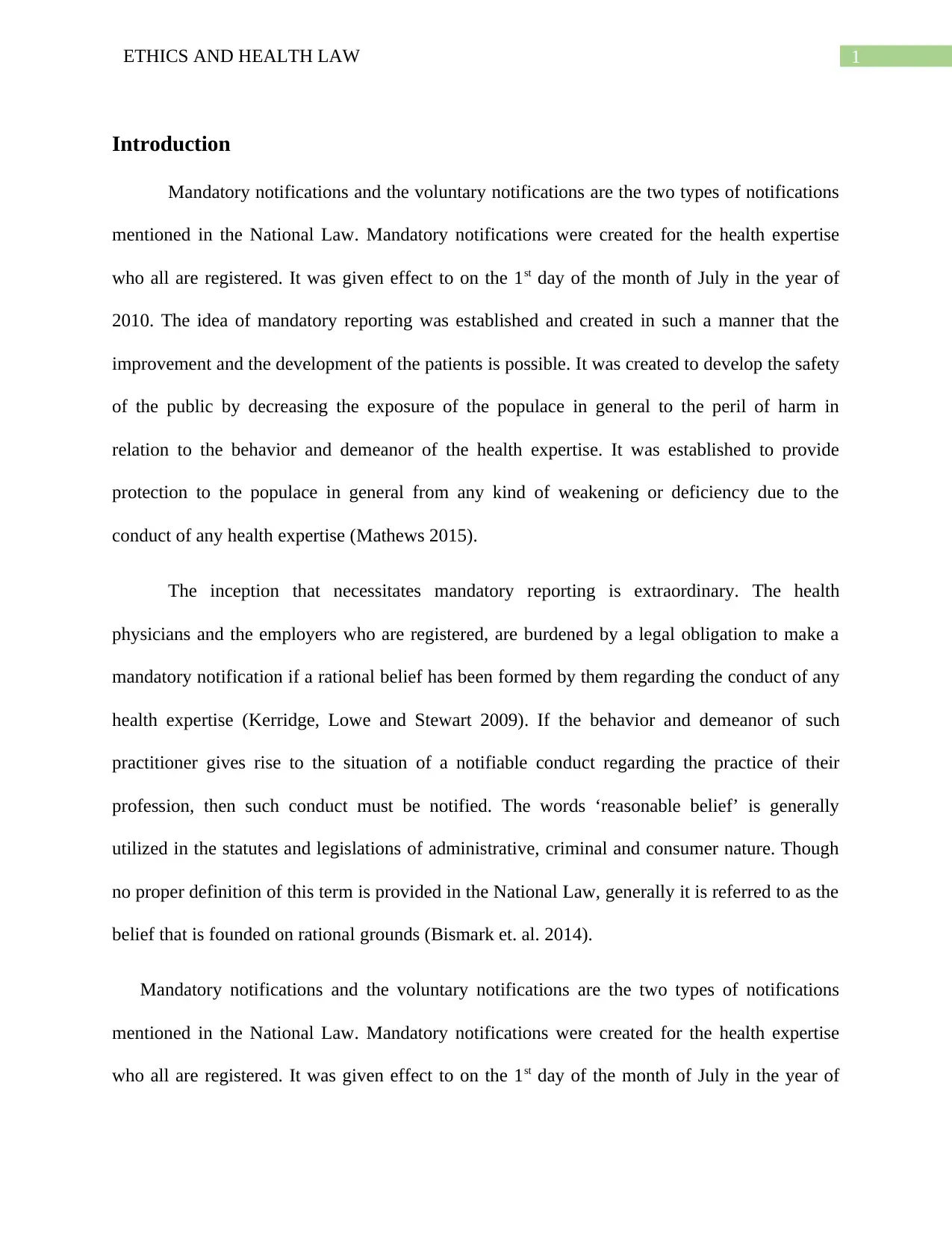
1ETHICS AND HEALTH LAW
Introduction
Mandatory notifications and the voluntary notifications are the two types of notifications
mentioned in the National Law. Mandatory notifications were created for the health expertise
who all are registered. It was given effect to on the 1st day of the month of July in the year of
2010. The idea of mandatory reporting was established and created in such a manner that the
improvement and the development of the patients is possible. It was created to develop the safety
of the public by decreasing the exposure of the populace in general to the peril of harm in
relation to the behavior and demeanor of the health expertise. It was established to provide
protection to the populace in general from any kind of weakening or deficiency due to the
conduct of any health expertise (Mathews 2015).
The inception that necessitates mandatory reporting is extraordinary. The health
physicians and the employers who are registered, are burdened by a legal obligation to make a
mandatory notification if a rational belief has been formed by them regarding the conduct of any
health expertise (Kerridge, Lowe and Stewart 2009). If the behavior and demeanor of such
practitioner gives rise to the situation of a notifiable conduct regarding the practice of their
profession, then such conduct must be notified. The words ‘reasonable belief’ is generally
utilized in the statutes and legislations of administrative, criminal and consumer nature. Though
no proper definition of this term is provided in the National Law, generally it is referred to as the
belief that is founded on rational grounds (Bismark et. al. 2014).
Mandatory notifications and the voluntary notifications are the two types of notifications
mentioned in the National Law. Mandatory notifications were created for the health expertise
who all are registered. It was given effect to on the 1st day of the month of July in the year of
Introduction
Mandatory notifications and the voluntary notifications are the two types of notifications
mentioned in the National Law. Mandatory notifications were created for the health expertise
who all are registered. It was given effect to on the 1st day of the month of July in the year of
2010. The idea of mandatory reporting was established and created in such a manner that the
improvement and the development of the patients is possible. It was created to develop the safety
of the public by decreasing the exposure of the populace in general to the peril of harm in
relation to the behavior and demeanor of the health expertise. It was established to provide
protection to the populace in general from any kind of weakening or deficiency due to the
conduct of any health expertise (Mathews 2015).
The inception that necessitates mandatory reporting is extraordinary. The health
physicians and the employers who are registered, are burdened by a legal obligation to make a
mandatory notification if a rational belief has been formed by them regarding the conduct of any
health expertise (Kerridge, Lowe and Stewart 2009). If the behavior and demeanor of such
practitioner gives rise to the situation of a notifiable conduct regarding the practice of their
profession, then such conduct must be notified. The words ‘reasonable belief’ is generally
utilized in the statutes and legislations of administrative, criminal and consumer nature. Though
no proper definition of this term is provided in the National Law, generally it is referred to as the
belief that is founded on rational grounds (Bismark et. al. 2014).
Mandatory notifications and the voluntary notifications are the two types of notifications
mentioned in the National Law. Mandatory notifications were created for the health expertise
who all are registered. It was given effect to on the 1st day of the month of July in the year of
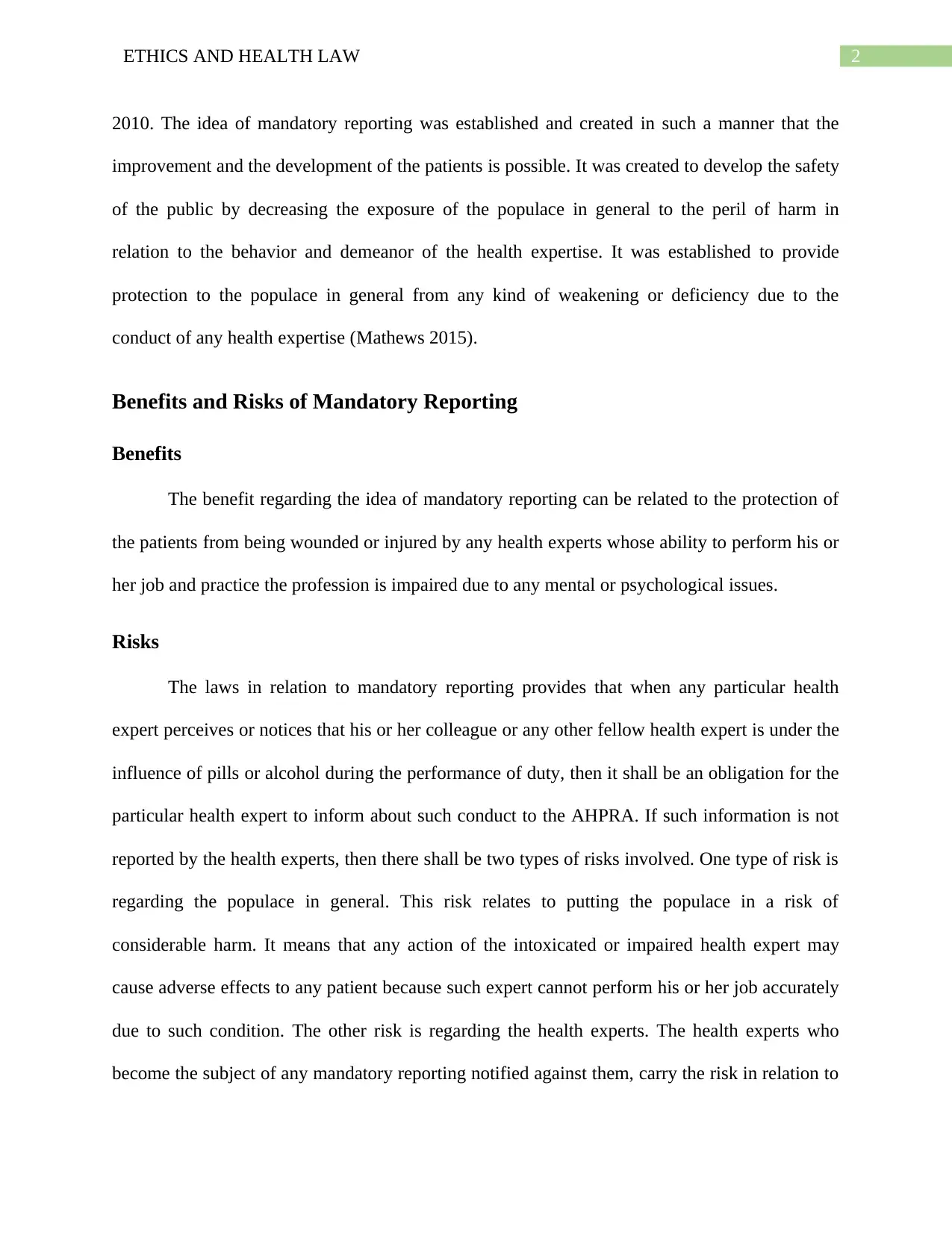
2ETHICS AND HEALTH LAW
2010. The idea of mandatory reporting was established and created in such a manner that the
improvement and the development of the patients is possible. It was created to develop the safety
of the public by decreasing the exposure of the populace in general to the peril of harm in
relation to the behavior and demeanor of the health expertise. It was established to provide
protection to the populace in general from any kind of weakening or deficiency due to the
conduct of any health expertise (Mathews 2015).
Benefits and Risks of Mandatory Reporting
Benefits
The benefit regarding the idea of mandatory reporting can be related to the protection of
the patients from being wounded or injured by any health experts whose ability to perform his or
her job and practice the profession is impaired due to any mental or psychological issues.
Risks
The laws in relation to mandatory reporting provides that when any particular health
expert perceives or notices that his or her colleague or any other fellow health expert is under the
influence of pills or alcohol during the performance of duty, then it shall be an obligation for the
particular health expert to inform about such conduct to the AHPRA. If such information is not
reported by the health experts, then there shall be two types of risks involved. One type of risk is
regarding the populace in general. This risk relates to putting the populace in a risk of
considerable harm. It means that any action of the intoxicated or impaired health expert may
cause adverse effects to any patient because such expert cannot perform his or her job accurately
due to such condition. The other risk is regarding the health experts. The health experts who
become the subject of any mandatory reporting notified against them, carry the risk in relation to
2010. The idea of mandatory reporting was established and created in such a manner that the
improvement and the development of the patients is possible. It was created to develop the safety
of the public by decreasing the exposure of the populace in general to the peril of harm in
relation to the behavior and demeanor of the health expertise. It was established to provide
protection to the populace in general from any kind of weakening or deficiency due to the
conduct of any health expertise (Mathews 2015).
Benefits and Risks of Mandatory Reporting
Benefits
The benefit regarding the idea of mandatory reporting can be related to the protection of
the patients from being wounded or injured by any health experts whose ability to perform his or
her job and practice the profession is impaired due to any mental or psychological issues.
Risks
The laws in relation to mandatory reporting provides that when any particular health
expert perceives or notices that his or her colleague or any other fellow health expert is under the
influence of pills or alcohol during the performance of duty, then it shall be an obligation for the
particular health expert to inform about such conduct to the AHPRA. If such information is not
reported by the health experts, then there shall be two types of risks involved. One type of risk is
regarding the populace in general. This risk relates to putting the populace in a risk of
considerable harm. It means that any action of the intoxicated or impaired health expert may
cause adverse effects to any patient because such expert cannot perform his or her job accurately
due to such condition. The other risk is regarding the health experts. The health experts who
become the subject of any mandatory reporting notified against them, carry the risk in relation to
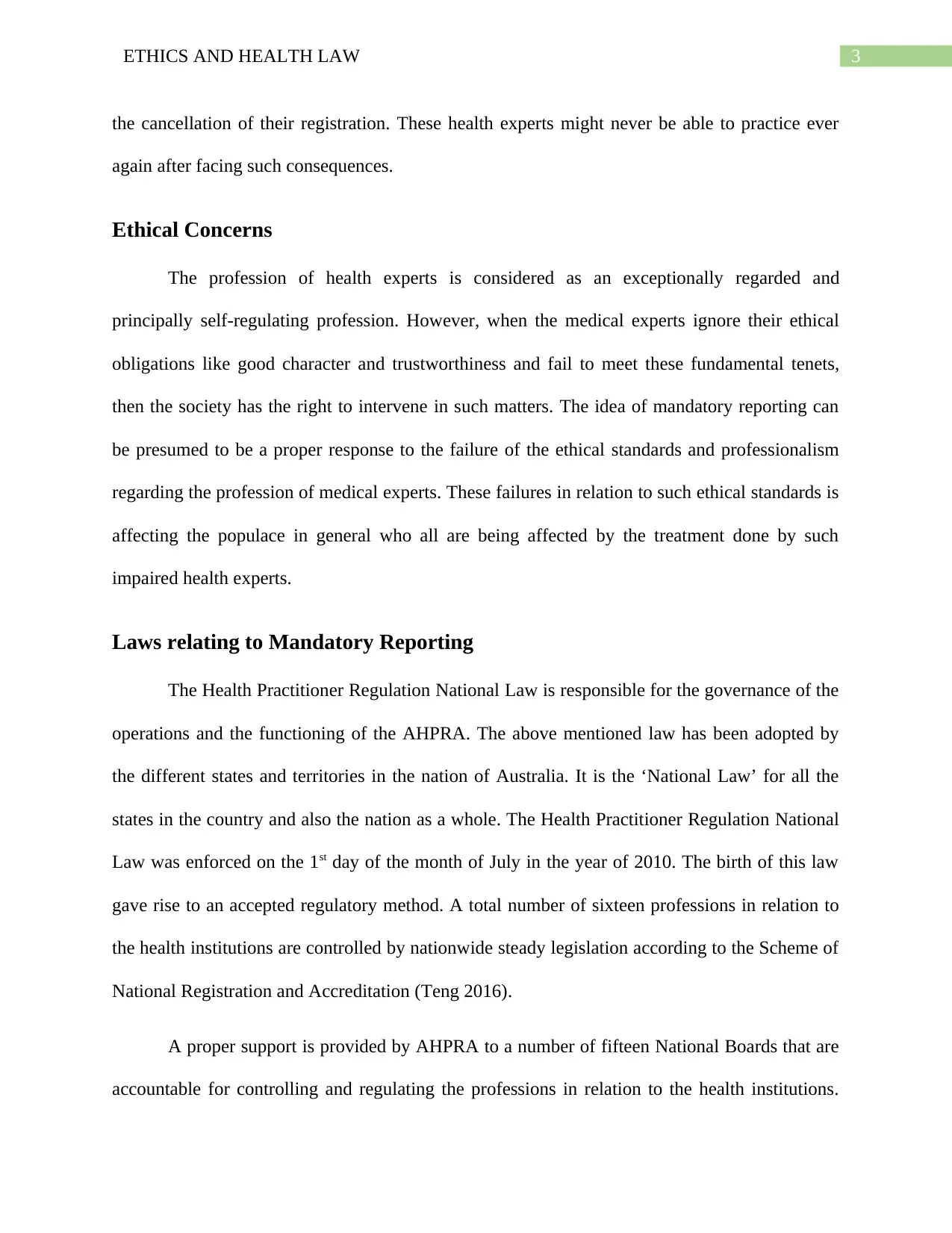
3ETHICS AND HEALTH LAW
the cancellation of their registration. These health experts might never be able to practice ever
again after facing such consequences.
Ethical Concerns
The profession of health experts is considered as an exceptionally regarded and
principally self-regulating profession. However, when the medical experts ignore their ethical
obligations like good character and trustworthiness and fail to meet these fundamental tenets,
then the society has the right to intervene in such matters. The idea of mandatory reporting can
be presumed to be a proper response to the failure of the ethical standards and professionalism
regarding the profession of medical experts. These failures in relation to such ethical standards is
affecting the populace in general who all are being affected by the treatment done by such
impaired health experts.
Laws relating to Mandatory Reporting
The Health Practitioner Regulation National Law is responsible for the governance of the
operations and the functioning of the AHPRA. The above mentioned law has been adopted by
the different states and territories in the nation of Australia. It is the ‘National Law’ for all the
states in the country and also the nation as a whole. The Health Practitioner Regulation National
Law was enforced on the 1st day of the month of July in the year of 2010. The birth of this law
gave rise to an accepted regulatory method. A total number of sixteen professions in relation to
the health institutions are controlled by nationwide steady legislation according to the Scheme of
National Registration and Accreditation (Teng 2016).
A proper support is provided by AHPRA to a number of fifteen National Boards that are
accountable for controlling and regulating the professions in relation to the health institutions.
the cancellation of their registration. These health experts might never be able to practice ever
again after facing such consequences.
Ethical Concerns
The profession of health experts is considered as an exceptionally regarded and
principally self-regulating profession. However, when the medical experts ignore their ethical
obligations like good character and trustworthiness and fail to meet these fundamental tenets,
then the society has the right to intervene in such matters. The idea of mandatory reporting can
be presumed to be a proper response to the failure of the ethical standards and professionalism
regarding the profession of medical experts. These failures in relation to such ethical standards is
affecting the populace in general who all are being affected by the treatment done by such
impaired health experts.
Laws relating to Mandatory Reporting
The Health Practitioner Regulation National Law is responsible for the governance of the
operations and the functioning of the AHPRA. The above mentioned law has been adopted by
the different states and territories in the nation of Australia. It is the ‘National Law’ for all the
states in the country and also the nation as a whole. The Health Practitioner Regulation National
Law was enforced on the 1st day of the month of July in the year of 2010. The birth of this law
gave rise to an accepted regulatory method. A total number of sixteen professions in relation to
the health institutions are controlled by nationwide steady legislation according to the Scheme of
National Registration and Accreditation (Teng 2016).
A proper support is provided by AHPRA to a number of fifteen National Boards that are
accountable for controlling and regulating the professions in relation to the health institutions.
Secure Best Marks with AI Grader
Need help grading? Try our AI Grader for instant feedback on your assignments.
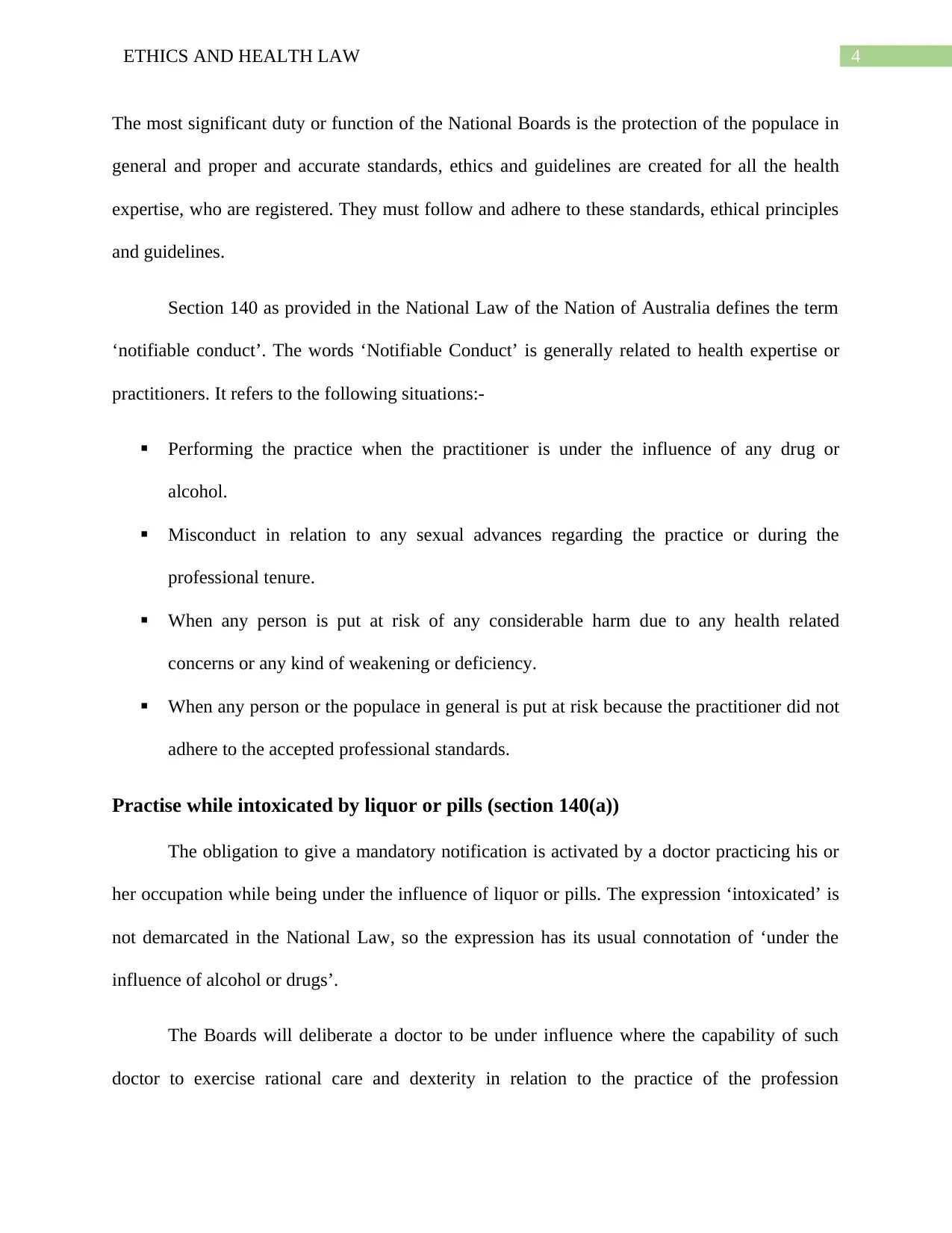
4ETHICS AND HEALTH LAW
The most significant duty or function of the National Boards is the protection of the populace in
general and proper and accurate standards, ethics and guidelines are created for all the health
expertise, who are registered. They must follow and adhere to these standards, ethical principles
and guidelines.
Section 140 as provided in the National Law of the Nation of Australia defines the term
‘notifiable conduct’. The words ‘Notifiable Conduct’ is generally related to health expertise or
practitioners. It refers to the following situations:-
Performing the practice when the practitioner is under the influence of any drug or
alcohol.
Misconduct in relation to any sexual advances regarding the practice or during the
professional tenure.
When any person is put at risk of any considerable harm due to any health related
concerns or any kind of weakening or deficiency.
When any person or the populace in general is put at risk because the practitioner did not
adhere to the accepted professional standards.
Practise while intoxicated by liquor or pills (section 140(a))
The obligation to give a mandatory notification is activated by a doctor practicing his or
her occupation while being under the influence of liquor or pills. The expression ‘intoxicated’ is
not demarcated in the National Law, so the expression has its usual connotation of ‘under the
influence of alcohol or drugs’.
The Boards will deliberate a doctor to be under influence where the capability of such
doctor to exercise rational care and dexterity in relation to the practice of the profession
The most significant duty or function of the National Boards is the protection of the populace in
general and proper and accurate standards, ethics and guidelines are created for all the health
expertise, who are registered. They must follow and adhere to these standards, ethical principles
and guidelines.
Section 140 as provided in the National Law of the Nation of Australia defines the term
‘notifiable conduct’. The words ‘Notifiable Conduct’ is generally related to health expertise or
practitioners. It refers to the following situations:-
Performing the practice when the practitioner is under the influence of any drug or
alcohol.
Misconduct in relation to any sexual advances regarding the practice or during the
professional tenure.
When any person is put at risk of any considerable harm due to any health related
concerns or any kind of weakening or deficiency.
When any person or the populace in general is put at risk because the practitioner did not
adhere to the accepted professional standards.
Practise while intoxicated by liquor or pills (section 140(a))
The obligation to give a mandatory notification is activated by a doctor practicing his or
her occupation while being under the influence of liquor or pills. The expression ‘intoxicated’ is
not demarcated in the National Law, so the expression has its usual connotation of ‘under the
influence of alcohol or drugs’.
The Boards will deliberate a doctor to be under influence where the capability of such
doctor to exercise rational care and dexterity in relation to the practice of the profession
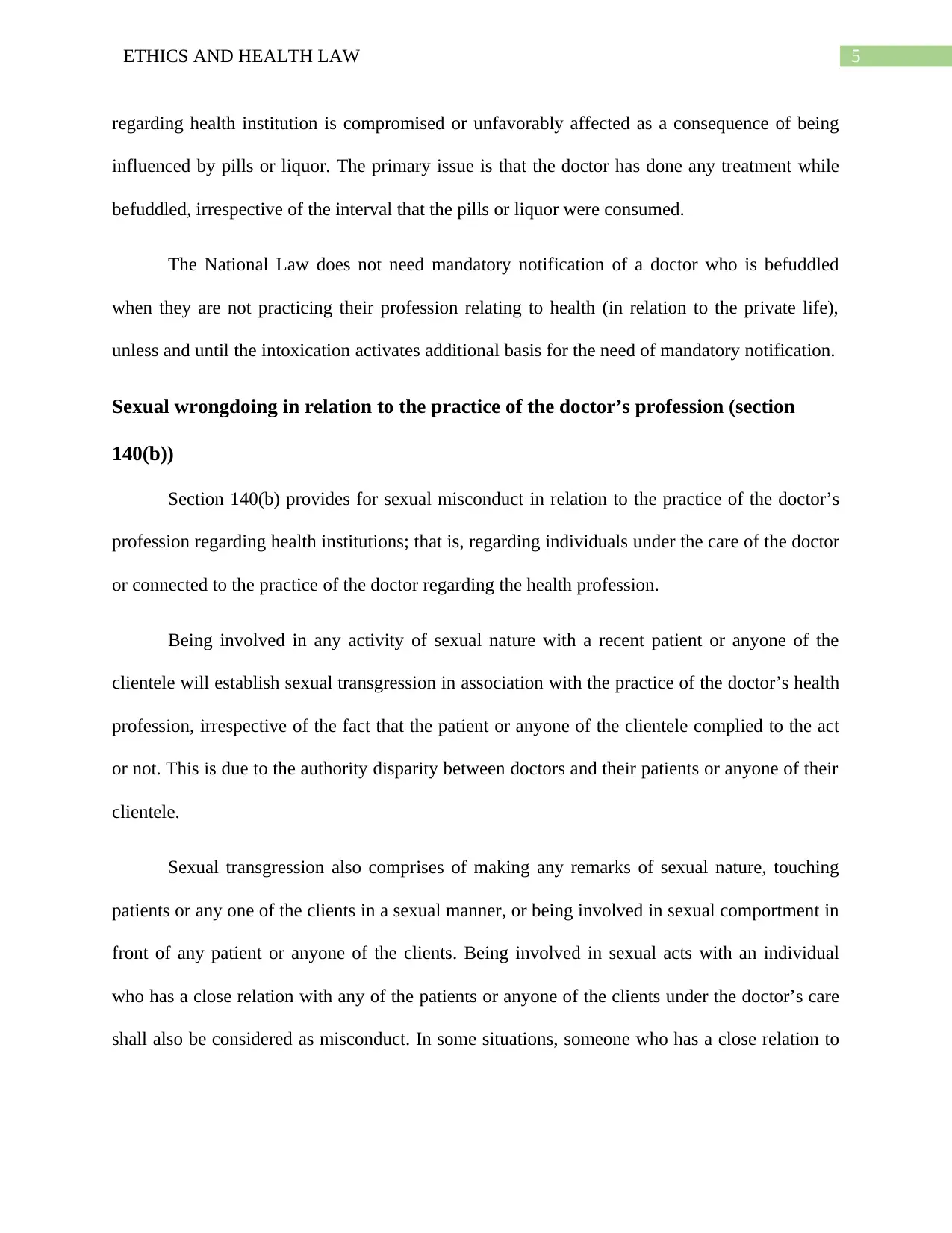
5ETHICS AND HEALTH LAW
regarding health institution is compromised or unfavorably affected as a consequence of being
influenced by pills or liquor. The primary issue is that the doctor has done any treatment while
befuddled, irrespective of the interval that the pills or liquor were consumed.
The National Law does not need mandatory notification of a doctor who is befuddled
when they are not practicing their profession relating to health (in relation to the private life),
unless and until the intoxication activates additional basis for the need of mandatory notification.
Sexual wrongdoing in relation to the practice of the doctor’s profession (section
140(b))
Section 140(b) provides for sexual misconduct in relation to the practice of the doctor’s
profession regarding health institutions; that is, regarding individuals under the care of the doctor
or connected to the practice of the doctor regarding the health profession.
Being involved in any activity of sexual nature with a recent patient or anyone of the
clientele will establish sexual transgression in association with the practice of the doctor’s health
profession, irrespective of the fact that the patient or anyone of the clientele complied to the act
or not. This is due to the authority disparity between doctors and their patients or anyone of their
clientele.
Sexual transgression also comprises of making any remarks of sexual nature, touching
patients or any one of the clients in a sexual manner, or being involved in sexual comportment in
front of any patient or anyone of the clients. Being involved in sexual acts with an individual
who has a close relation with any of the patients or anyone of the clients under the doctor’s care
shall also be considered as misconduct. In some situations, someone who has a close relation to
regarding health institution is compromised or unfavorably affected as a consequence of being
influenced by pills or liquor. The primary issue is that the doctor has done any treatment while
befuddled, irrespective of the interval that the pills or liquor were consumed.
The National Law does not need mandatory notification of a doctor who is befuddled
when they are not practicing their profession relating to health (in relation to the private life),
unless and until the intoxication activates additional basis for the need of mandatory notification.
Sexual wrongdoing in relation to the practice of the doctor’s profession (section
140(b))
Section 140(b) provides for sexual misconduct in relation to the practice of the doctor’s
profession regarding health institutions; that is, regarding individuals under the care of the doctor
or connected to the practice of the doctor regarding the health profession.
Being involved in any activity of sexual nature with a recent patient or anyone of the
clientele will establish sexual transgression in association with the practice of the doctor’s health
profession, irrespective of the fact that the patient or anyone of the clientele complied to the act
or not. This is due to the authority disparity between doctors and their patients or anyone of their
clientele.
Sexual transgression also comprises of making any remarks of sexual nature, touching
patients or any one of the clients in a sexual manner, or being involved in sexual comportment in
front of any patient or anyone of the clients. Being involved in sexual acts with an individual
who has a close relation with any of the patients or anyone of the clients under the doctor’s care
shall also be considered as misconduct. In some situations, someone who has a close relation to
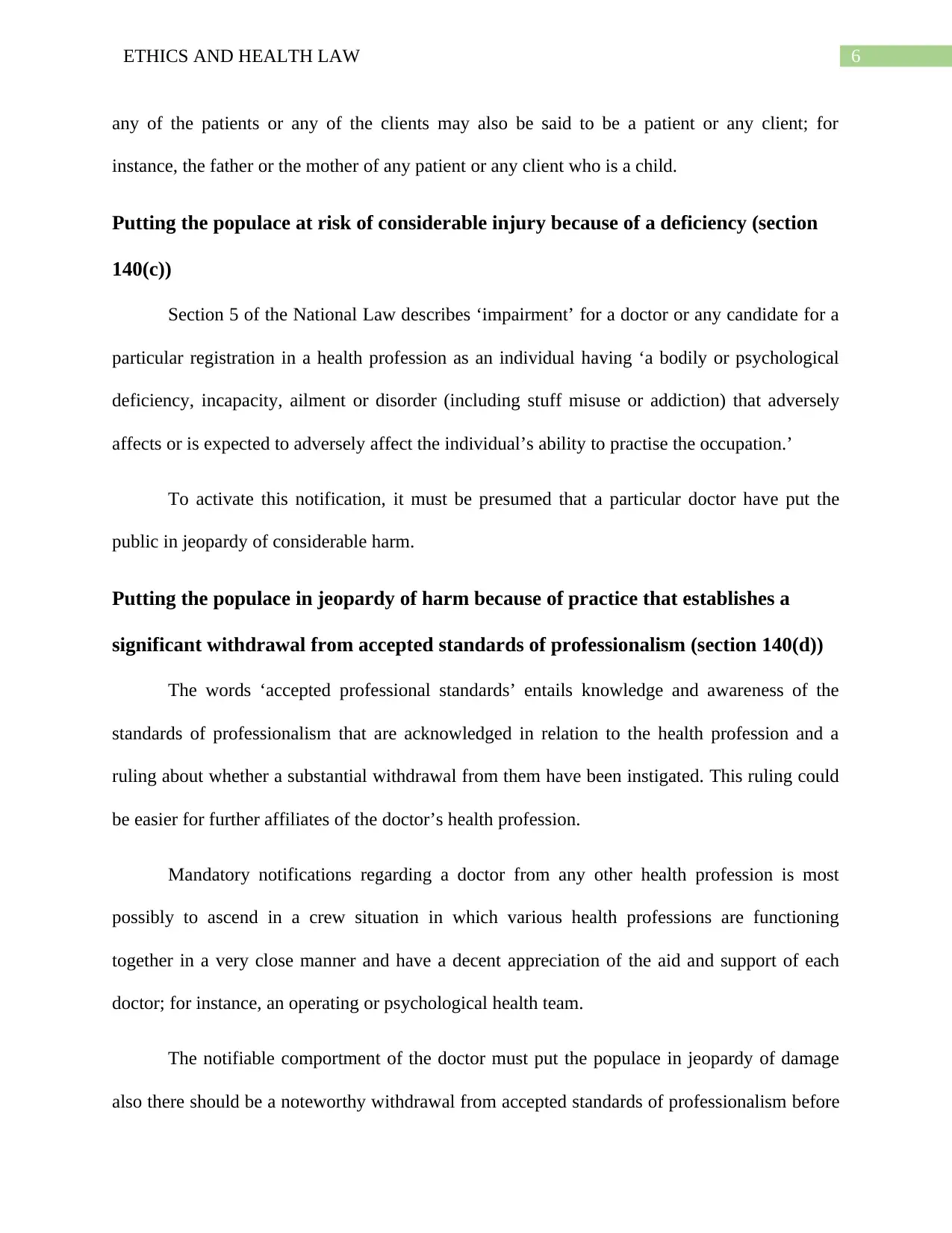
6ETHICS AND HEALTH LAW
any of the patients or any of the clients may also be said to be a patient or any client; for
instance, the father or the mother of any patient or any client who is a child.
Putting the populace at risk of considerable injury because of a deficiency (section
140(c))
Section 5 of the National Law describes ‘impairment’ for a doctor or any candidate for a
particular registration in a health profession as an individual having ‘a bodily or psychological
deficiency, incapacity, ailment or disorder (including stuff misuse or addiction) that adversely
affects or is expected to adversely affect the individual’s ability to practise the occupation.’
To activate this notification, it must be presumed that a particular doctor have put the
public in jeopardy of considerable harm.
Putting the populace in jeopardy of harm because of practice that establishes a
significant withdrawal from accepted standards of professionalism (section 140(d))
The words ‘accepted professional standards’ entails knowledge and awareness of the
standards of professionalism that are acknowledged in relation to the health profession and a
ruling about whether a substantial withdrawal from them have been instigated. This ruling could
be easier for further affiliates of the doctor’s health profession.
Mandatory notifications regarding a doctor from any other health profession is most
possibly to ascend in a crew situation in which various health professions are functioning
together in a very close manner and have a decent appreciation of the aid and support of each
doctor; for instance, an operating or psychological health team.
The notifiable comportment of the doctor must put the populace in jeopardy of damage
also there should be a noteworthy withdrawal from accepted standards of professionalism before
any of the patients or any of the clients may also be said to be a patient or any client; for
instance, the father or the mother of any patient or any client who is a child.
Putting the populace at risk of considerable injury because of a deficiency (section
140(c))
Section 5 of the National Law describes ‘impairment’ for a doctor or any candidate for a
particular registration in a health profession as an individual having ‘a bodily or psychological
deficiency, incapacity, ailment or disorder (including stuff misuse or addiction) that adversely
affects or is expected to adversely affect the individual’s ability to practise the occupation.’
To activate this notification, it must be presumed that a particular doctor have put the
public in jeopardy of considerable harm.
Putting the populace in jeopardy of harm because of practice that establishes a
significant withdrawal from accepted standards of professionalism (section 140(d))
The words ‘accepted professional standards’ entails knowledge and awareness of the
standards of professionalism that are acknowledged in relation to the health profession and a
ruling about whether a substantial withdrawal from them have been instigated. This ruling could
be easier for further affiliates of the doctor’s health profession.
Mandatory notifications regarding a doctor from any other health profession is most
possibly to ascend in a crew situation in which various health professions are functioning
together in a very close manner and have a decent appreciation of the aid and support of each
doctor; for instance, an operating or psychological health team.
The notifiable comportment of the doctor must put the populace in jeopardy of damage
also there should be a noteworthy withdrawal from accepted standards of professionalism before
Paraphrase This Document
Need a fresh take? Get an instant paraphrase of this document with our AI Paraphraser
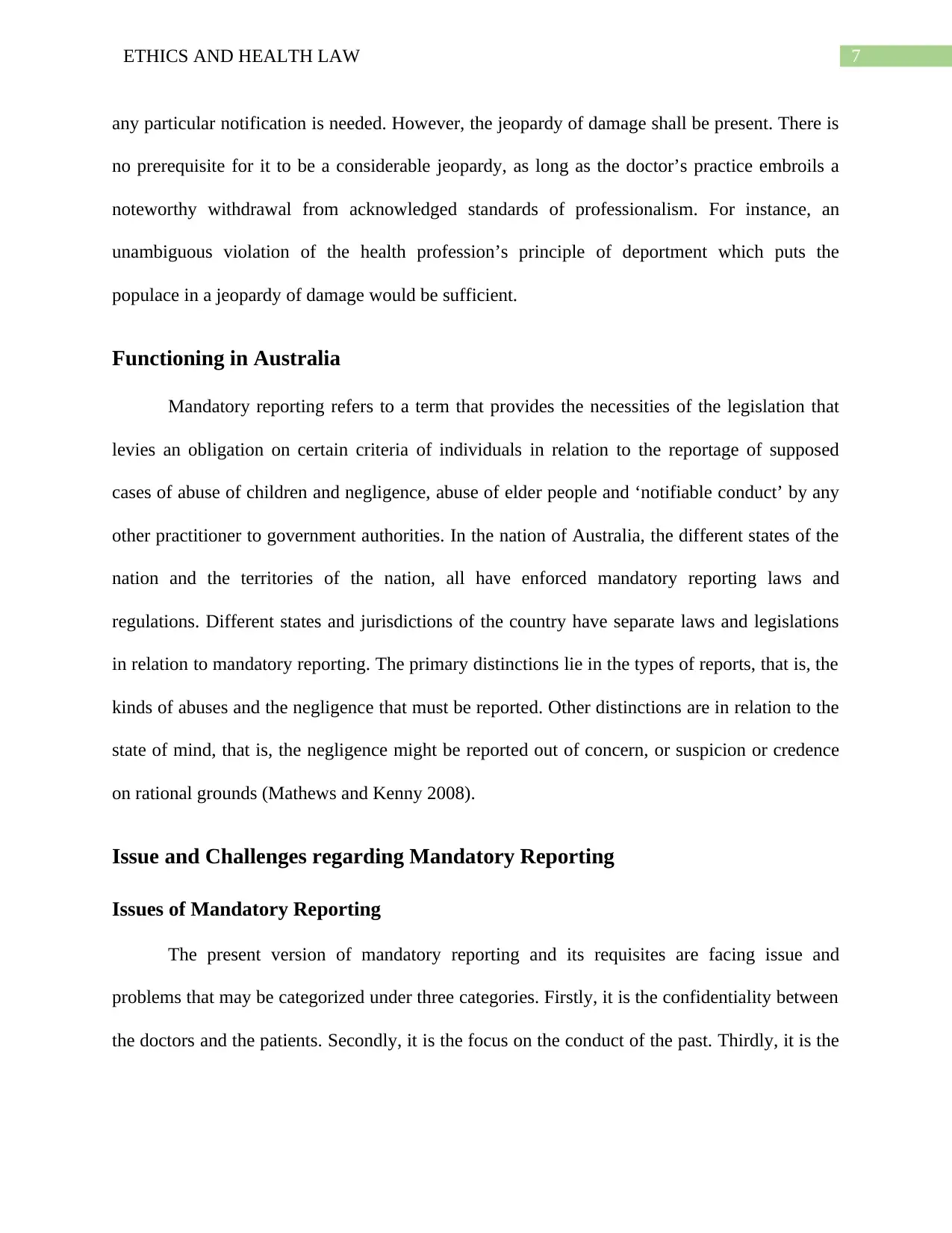
7ETHICS AND HEALTH LAW
any particular notification is needed. However, the jeopardy of damage shall be present. There is
no prerequisite for it to be a considerable jeopardy, as long as the doctor’s practice embroils a
noteworthy withdrawal from acknowledged standards of professionalism. For instance, an
unambiguous violation of the health profession’s principle of deportment which puts the
populace in a jeopardy of damage would be sufficient.
Functioning in Australia
Mandatory reporting refers to a term that provides the necessities of the legislation that
levies an obligation on certain criteria of individuals in relation to the reportage of supposed
cases of abuse of children and negligence, abuse of elder people and ‘notifiable conduct’ by any
other practitioner to government authorities. In the nation of Australia, the different states of the
nation and the territories of the nation, all have enforced mandatory reporting laws and
regulations. Different states and jurisdictions of the country have separate laws and legislations
in relation to mandatory reporting. The primary distinctions lie in the types of reports, that is, the
kinds of abuses and the negligence that must be reported. Other distinctions are in relation to the
state of mind, that is, the negligence might be reported out of concern, or suspicion or credence
on rational grounds (Mathews and Kenny 2008).
Issue and Challenges regarding Mandatory Reporting
Issues of Mandatory Reporting
The present version of mandatory reporting and its requisites are facing issue and
problems that may be categorized under three categories. Firstly, it is the confidentiality between
the doctors and the patients. Secondly, it is the focus on the conduct of the past. Thirdly, it is the
any particular notification is needed. However, the jeopardy of damage shall be present. There is
no prerequisite for it to be a considerable jeopardy, as long as the doctor’s practice embroils a
noteworthy withdrawal from acknowledged standards of professionalism. For instance, an
unambiguous violation of the health profession’s principle of deportment which puts the
populace in a jeopardy of damage would be sufficient.
Functioning in Australia
Mandatory reporting refers to a term that provides the necessities of the legislation that
levies an obligation on certain criteria of individuals in relation to the reportage of supposed
cases of abuse of children and negligence, abuse of elder people and ‘notifiable conduct’ by any
other practitioner to government authorities. In the nation of Australia, the different states of the
nation and the territories of the nation, all have enforced mandatory reporting laws and
regulations. Different states and jurisdictions of the country have separate laws and legislations
in relation to mandatory reporting. The primary distinctions lie in the types of reports, that is, the
kinds of abuses and the negligence that must be reported. Other distinctions are in relation to the
state of mind, that is, the negligence might be reported out of concern, or suspicion or credence
on rational grounds (Mathews and Kenny 2008).
Issue and Challenges regarding Mandatory Reporting
Issues of Mandatory Reporting
The present version of mandatory reporting and its requisites are facing issue and
problems that may be categorized under three categories. Firstly, it is the confidentiality between
the doctors and the patients. Secondly, it is the focus on the conduct of the past. Thirdly, it is the
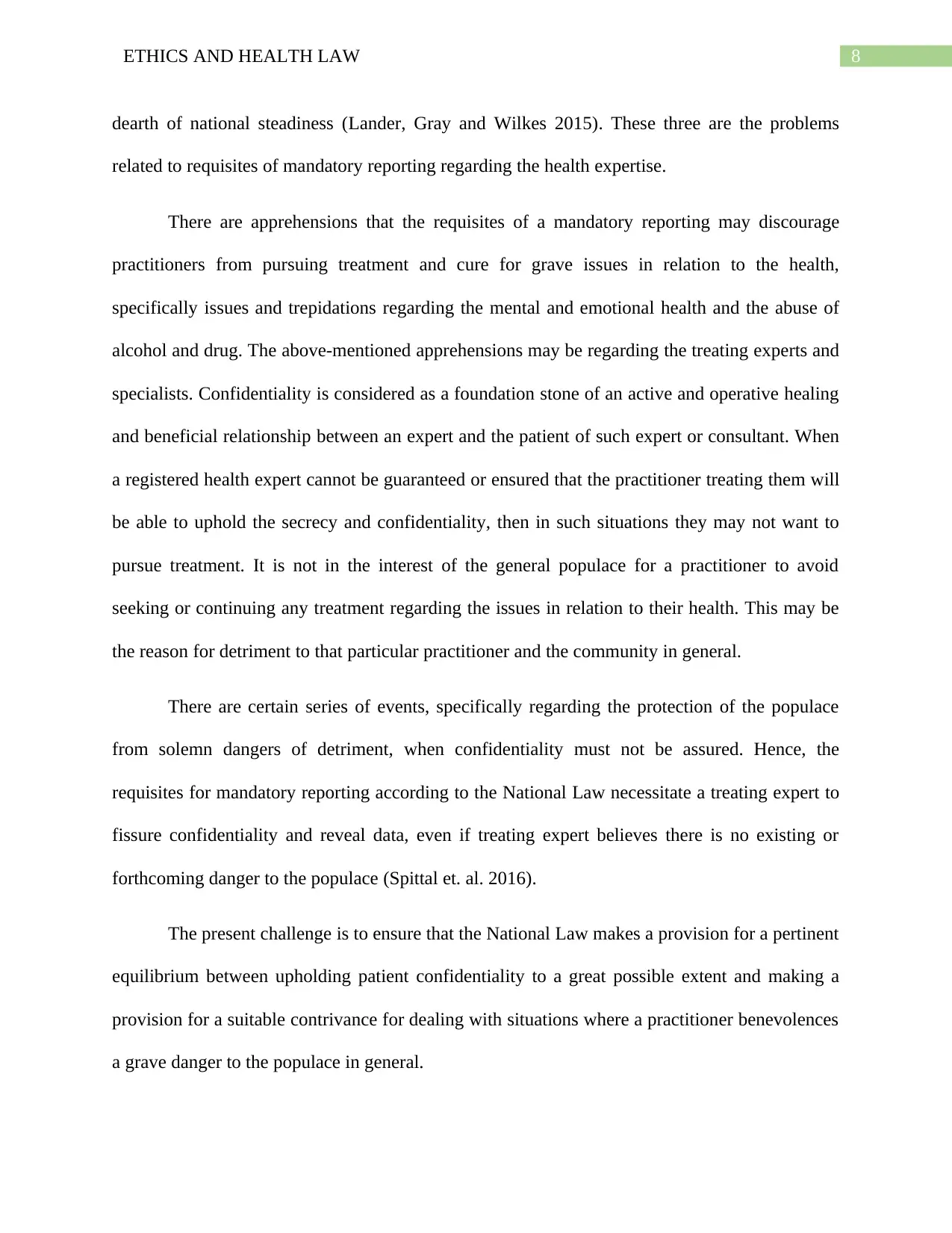
8ETHICS AND HEALTH LAW
dearth of national steadiness (Lander, Gray and Wilkes 2015). These three are the problems
related to requisites of mandatory reporting regarding the health expertise.
There are apprehensions that the requisites of a mandatory reporting may discourage
practitioners from pursuing treatment and cure for grave issues in relation to the health,
specifically issues and trepidations regarding the mental and emotional health and the abuse of
alcohol and drug. The above-mentioned apprehensions may be regarding the treating experts and
specialists. Confidentiality is considered as a foundation stone of an active and operative healing
and beneficial relationship between an expert and the patient of such expert or consultant. When
a registered health expert cannot be guaranteed or ensured that the practitioner treating them will
be able to uphold the secrecy and confidentiality, then in such situations they may not want to
pursue treatment. It is not in the interest of the general populace for a practitioner to avoid
seeking or continuing any treatment regarding the issues in relation to their health. This may be
the reason for detriment to that particular practitioner and the community in general.
There are certain series of events, specifically regarding the protection of the populace
from solemn dangers of detriment, when confidentiality must not be assured. Hence, the
requisites for mandatory reporting according to the National Law necessitate a treating expert to
fissure confidentiality and reveal data, even if treating expert believes there is no existing or
forthcoming danger to the populace (Spittal et. al. 2016).
The present challenge is to ensure that the National Law makes a provision for a pertinent
equilibrium between upholding patient confidentiality to a great possible extent and making a
provision for a suitable contrivance for dealing with situations where a practitioner benevolences
a grave danger to the populace in general.
dearth of national steadiness (Lander, Gray and Wilkes 2015). These three are the problems
related to requisites of mandatory reporting regarding the health expertise.
There are apprehensions that the requisites of a mandatory reporting may discourage
practitioners from pursuing treatment and cure for grave issues in relation to the health,
specifically issues and trepidations regarding the mental and emotional health and the abuse of
alcohol and drug. The above-mentioned apprehensions may be regarding the treating experts and
specialists. Confidentiality is considered as a foundation stone of an active and operative healing
and beneficial relationship between an expert and the patient of such expert or consultant. When
a registered health expert cannot be guaranteed or ensured that the practitioner treating them will
be able to uphold the secrecy and confidentiality, then in such situations they may not want to
pursue treatment. It is not in the interest of the general populace for a practitioner to avoid
seeking or continuing any treatment regarding the issues in relation to their health. This may be
the reason for detriment to that particular practitioner and the community in general.
There are certain series of events, specifically regarding the protection of the populace
from solemn dangers of detriment, when confidentiality must not be assured. Hence, the
requisites for mandatory reporting according to the National Law necessitate a treating expert to
fissure confidentiality and reveal data, even if treating expert believes there is no existing or
forthcoming danger to the populace (Spittal et. al. 2016).
The present challenge is to ensure that the National Law makes a provision for a pertinent
equilibrium between upholding patient confidentiality to a great possible extent and making a
provision for a suitable contrivance for dealing with situations where a practitioner benevolences
a grave danger to the populace in general.
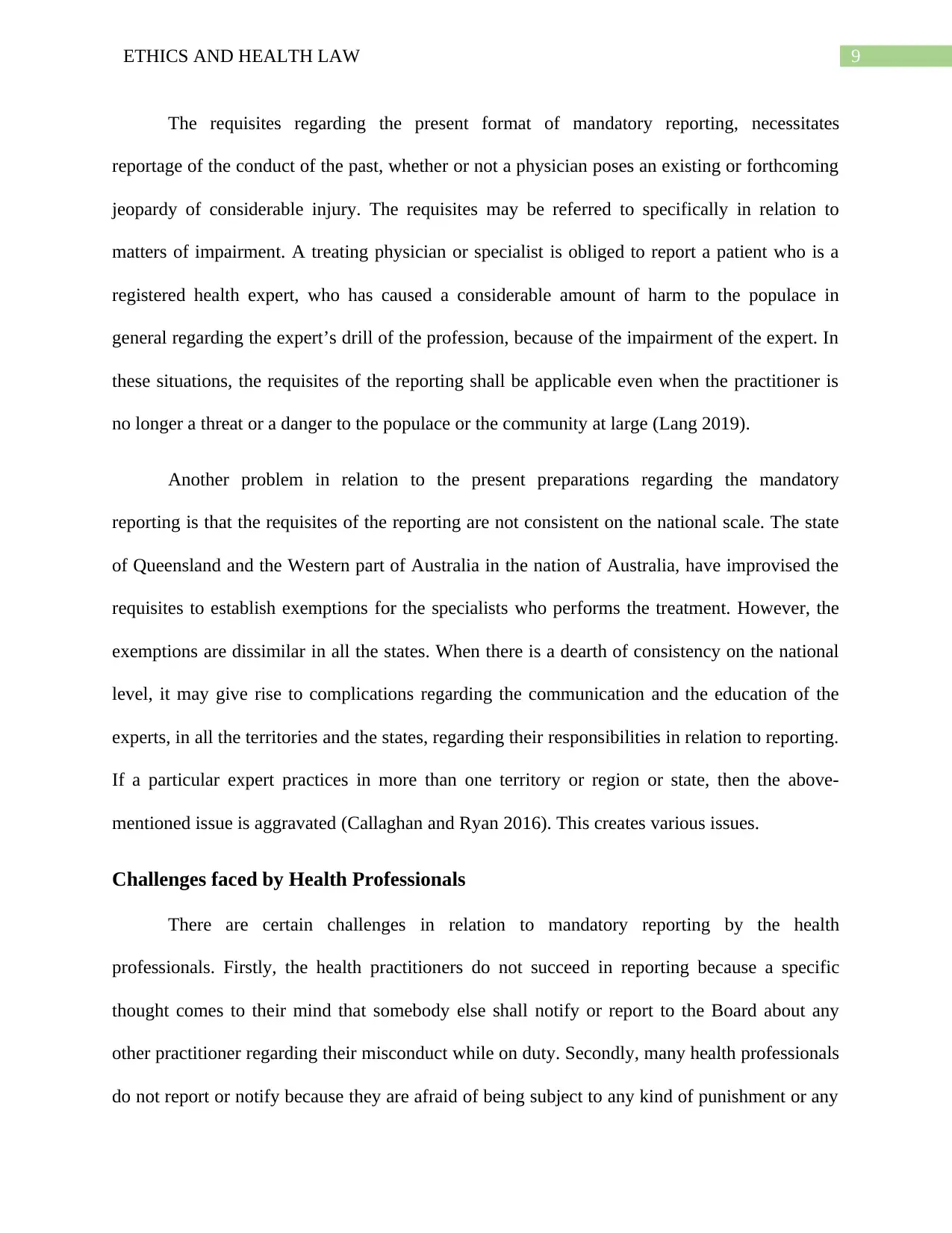
9ETHICS AND HEALTH LAW
The requisites regarding the present format of mandatory reporting, necessitates
reportage of the conduct of the past, whether or not a physician poses an existing or forthcoming
jeopardy of considerable injury. The requisites may be referred to specifically in relation to
matters of impairment. A treating physician or specialist is obliged to report a patient who is a
registered health expert, who has caused a considerable amount of harm to the populace in
general regarding the expert’s drill of the profession, because of the impairment of the expert. In
these situations, the requisites of the reporting shall be applicable even when the practitioner is
no longer a threat or a danger to the populace or the community at large (Lang 2019).
Another problem in relation to the present preparations regarding the mandatory
reporting is that the requisites of the reporting are not consistent on the national scale. The state
of Queensland and the Western part of Australia in the nation of Australia, have improvised the
requisites to establish exemptions for the specialists who performs the treatment. However, the
exemptions are dissimilar in all the states. When there is a dearth of consistency on the national
level, it may give rise to complications regarding the communication and the education of the
experts, in all the territories and the states, regarding their responsibilities in relation to reporting.
If a particular expert practices in more than one territory or region or state, then the above-
mentioned issue is aggravated (Callaghan and Ryan 2016). This creates various issues.
Challenges faced by Health Professionals
There are certain challenges in relation to mandatory reporting by the health
professionals. Firstly, the health practitioners do not succeed in reporting because a specific
thought comes to their mind that somebody else shall notify or report to the Board about any
other practitioner regarding their misconduct while on duty. Secondly, many health professionals
do not report or notify because they are afraid of being subject to any kind of punishment or any
The requisites regarding the present format of mandatory reporting, necessitates
reportage of the conduct of the past, whether or not a physician poses an existing or forthcoming
jeopardy of considerable injury. The requisites may be referred to specifically in relation to
matters of impairment. A treating physician or specialist is obliged to report a patient who is a
registered health expert, who has caused a considerable amount of harm to the populace in
general regarding the expert’s drill of the profession, because of the impairment of the expert. In
these situations, the requisites of the reporting shall be applicable even when the practitioner is
no longer a threat or a danger to the populace or the community at large (Lang 2019).
Another problem in relation to the present preparations regarding the mandatory
reporting is that the requisites of the reporting are not consistent on the national scale. The state
of Queensland and the Western part of Australia in the nation of Australia, have improvised the
requisites to establish exemptions for the specialists who performs the treatment. However, the
exemptions are dissimilar in all the states. When there is a dearth of consistency on the national
level, it may give rise to complications regarding the communication and the education of the
experts, in all the territories and the states, regarding their responsibilities in relation to reporting.
If a particular expert practices in more than one territory or region or state, then the above-
mentioned issue is aggravated (Callaghan and Ryan 2016). This creates various issues.
Challenges faced by Health Professionals
There are certain challenges in relation to mandatory reporting by the health
professionals. Firstly, the health practitioners do not succeed in reporting because a specific
thought comes to their mind that somebody else shall notify or report to the Board about any
other practitioner regarding their misconduct while on duty. Secondly, many health professionals
do not report or notify because they are afraid of being subject to any kind of punishment or any
Secure Best Marks with AI Grader
Need help grading? Try our AI Grader for instant feedback on your assignments.
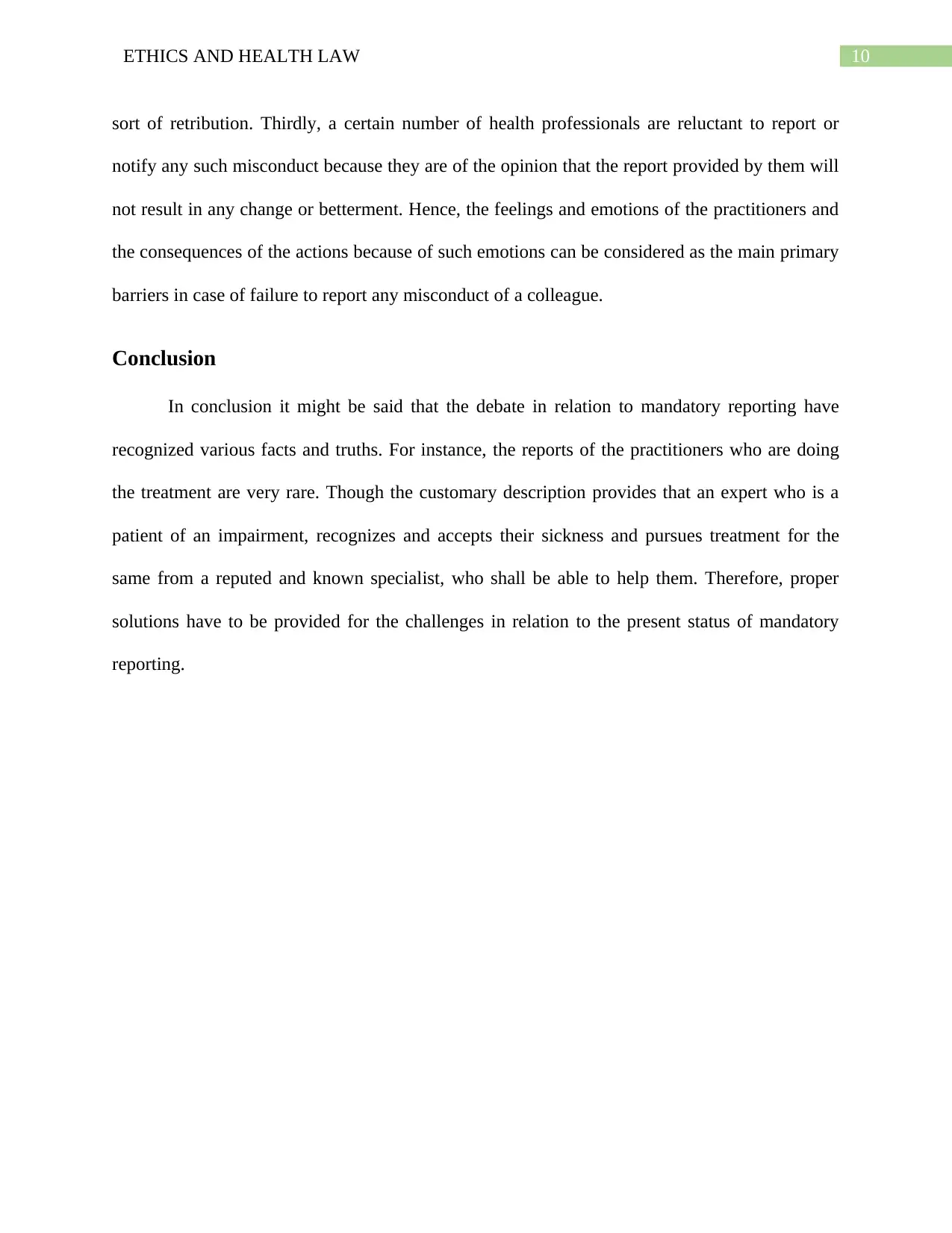
10ETHICS AND HEALTH LAW
sort of retribution. Thirdly, a certain number of health professionals are reluctant to report or
notify any such misconduct because they are of the opinion that the report provided by them will
not result in any change or betterment. Hence, the feelings and emotions of the practitioners and
the consequences of the actions because of such emotions can be considered as the main primary
barriers in case of failure to report any misconduct of a colleague.
Conclusion
In conclusion it might be said that the debate in relation to mandatory reporting have
recognized various facts and truths. For instance, the reports of the practitioners who are doing
the treatment are very rare. Though the customary description provides that an expert who is a
patient of an impairment, recognizes and accepts their sickness and pursues treatment for the
same from a reputed and known specialist, who shall be able to help them. Therefore, proper
solutions have to be provided for the challenges in relation to the present status of mandatory
reporting.
sort of retribution. Thirdly, a certain number of health professionals are reluctant to report or
notify any such misconduct because they are of the opinion that the report provided by them will
not result in any change or betterment. Hence, the feelings and emotions of the practitioners and
the consequences of the actions because of such emotions can be considered as the main primary
barriers in case of failure to report any misconduct of a colleague.
Conclusion
In conclusion it might be said that the debate in relation to mandatory reporting have
recognized various facts and truths. For instance, the reports of the practitioners who are doing
the treatment are very rare. Though the customary description provides that an expert who is a
patient of an impairment, recognizes and accepts their sickness and pursues treatment for the
same from a reputed and known specialist, who shall be able to help them. Therefore, proper
solutions have to be provided for the challenges in relation to the present status of mandatory
reporting.
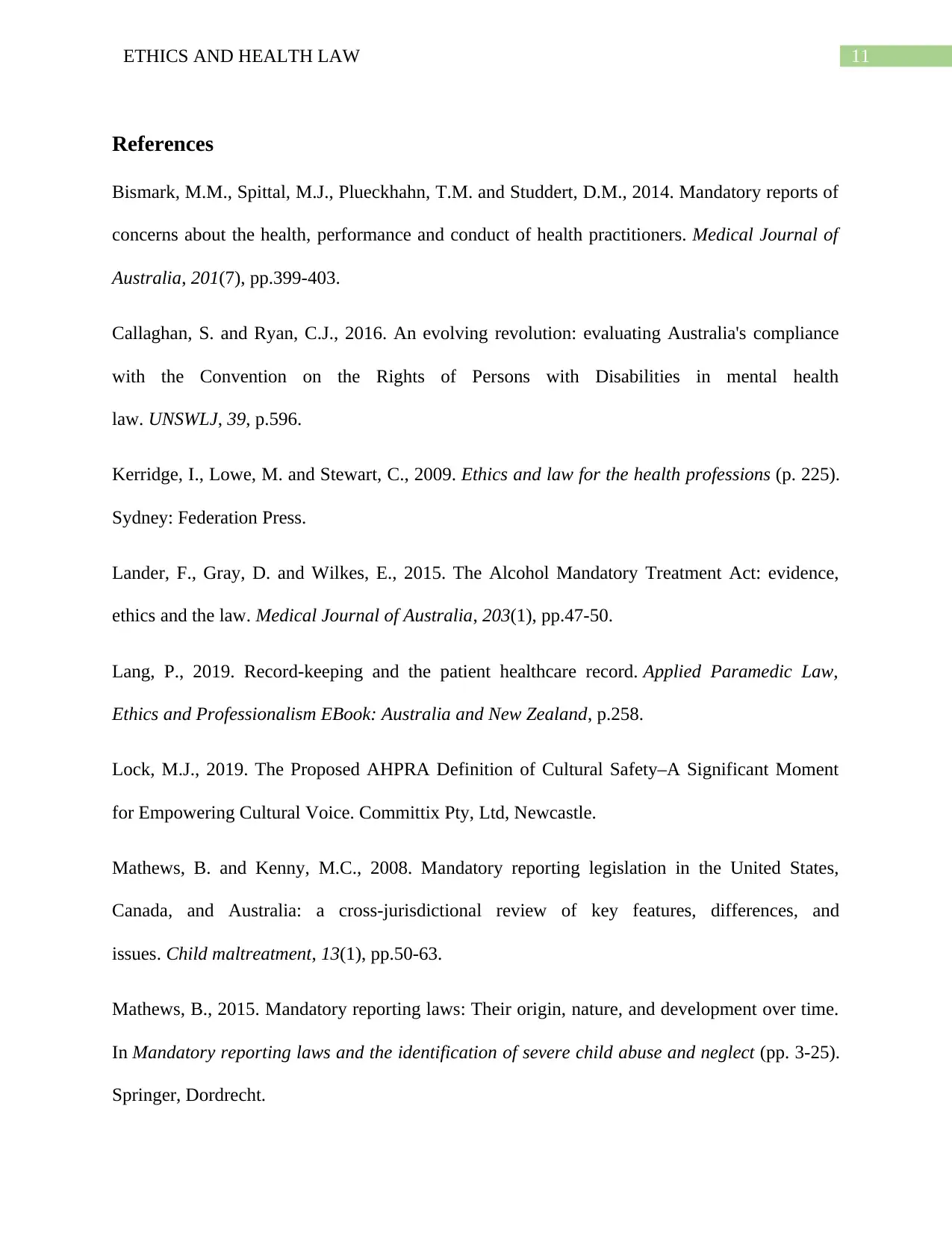
11ETHICS AND HEALTH LAW
References
Bismark, M.M., Spittal, M.J., Plueckhahn, T.M. and Studdert, D.M., 2014. Mandatory reports of
concerns about the health, performance and conduct of health practitioners. Medical Journal of
Australia, 201(7), pp.399-403.
Callaghan, S. and Ryan, C.J., 2016. An evolving revolution: evaluating Australia's compliance
with the Convention on the Rights of Persons with Disabilities in mental health
law. UNSWLJ, 39, p.596.
Kerridge, I., Lowe, M. and Stewart, C., 2009. Ethics and law for the health professions (p. 225).
Sydney: Federation Press.
Lander, F., Gray, D. and Wilkes, E., 2015. The Alcohol Mandatory Treatment Act: evidence,
ethics and the law. Medical Journal of Australia, 203(1), pp.47-50.
Lang, P., 2019. Record-keeping and the patient healthcare record. Applied Paramedic Law,
Ethics and Professionalism EBook: Australia and New Zealand, p.258.
Lock, M.J., 2019. The Proposed AHPRA Definition of Cultural Safety–A Significant Moment
for Empowering Cultural Voice. Committix Pty, Ltd, Newcastle.
Mathews, B. and Kenny, M.C., 2008. Mandatory reporting legislation in the United States,
Canada, and Australia: a cross-jurisdictional review of key features, differences, and
issues. Child maltreatment, 13(1), pp.50-63.
Mathews, B., 2015. Mandatory reporting laws: Their origin, nature, and development over time.
In Mandatory reporting laws and the identification of severe child abuse and neglect (pp. 3-25).
Springer, Dordrecht.
References
Bismark, M.M., Spittal, M.J., Plueckhahn, T.M. and Studdert, D.M., 2014. Mandatory reports of
concerns about the health, performance and conduct of health practitioners. Medical Journal of
Australia, 201(7), pp.399-403.
Callaghan, S. and Ryan, C.J., 2016. An evolving revolution: evaluating Australia's compliance
with the Convention on the Rights of Persons with Disabilities in mental health
law. UNSWLJ, 39, p.596.
Kerridge, I., Lowe, M. and Stewart, C., 2009. Ethics and law for the health professions (p. 225).
Sydney: Federation Press.
Lander, F., Gray, D. and Wilkes, E., 2015. The Alcohol Mandatory Treatment Act: evidence,
ethics and the law. Medical Journal of Australia, 203(1), pp.47-50.
Lang, P., 2019. Record-keeping and the patient healthcare record. Applied Paramedic Law,
Ethics and Professionalism EBook: Australia and New Zealand, p.258.
Lock, M.J., 2019. The Proposed AHPRA Definition of Cultural Safety–A Significant Moment
for Empowering Cultural Voice. Committix Pty, Ltd, Newcastle.
Mathews, B. and Kenny, M.C., 2008. Mandatory reporting legislation in the United States,
Canada, and Australia: a cross-jurisdictional review of key features, differences, and
issues. Child maltreatment, 13(1), pp.50-63.
Mathews, B., 2015. Mandatory reporting laws: Their origin, nature, and development over time.
In Mandatory reporting laws and the identification of severe child abuse and neglect (pp. 3-25).
Springer, Dordrecht.
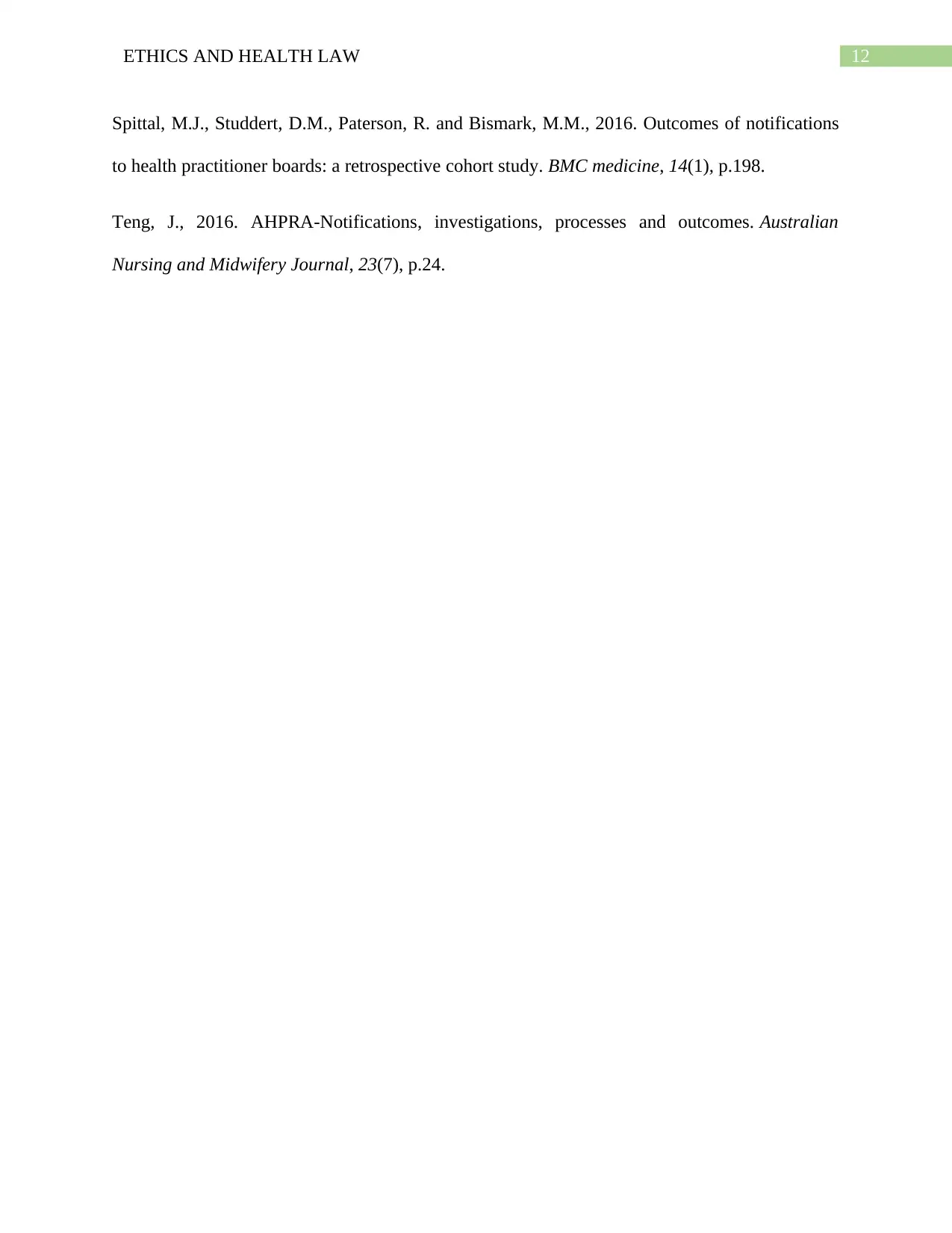
12ETHICS AND HEALTH LAW
Spittal, M.J., Studdert, D.M., Paterson, R. and Bismark, M.M., 2016. Outcomes of notifications
to health practitioner boards: a retrospective cohort study. BMC medicine, 14(1), p.198.
Teng, J., 2016. AHPRA-Notifications, investigations, processes and outcomes. Australian
Nursing and Midwifery Journal, 23(7), p.24.
Spittal, M.J., Studdert, D.M., Paterson, R. and Bismark, M.M., 2016. Outcomes of notifications
to health practitioner boards: a retrospective cohort study. BMC medicine, 14(1), p.198.
Teng, J., 2016. AHPRA-Notifications, investigations, processes and outcomes. Australian
Nursing and Midwifery Journal, 23(7), p.24.
1 out of 13
Your All-in-One AI-Powered Toolkit for Academic Success.
+13062052269
info@desklib.com
Available 24*7 on WhatsApp / Email
![[object Object]](/_next/static/media/star-bottom.7253800d.svg)
Unlock your academic potential
© 2024 | Zucol Services PVT LTD | All rights reserved.

